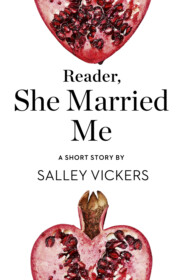По всем вопросам обращайтесь на: info@litportal.ru
(©) 2003-2024.
✖
Miss Garnet’s Angel
Автор
Год написания книги
2019
Настройки чтения
Размер шрифта
Высота строк
Поля
‘Such a beatific smile.’ Julia was thinking of the angel.
‘Indeed. She is most charming, your young friend,’ said Carlo, politely misunderstanding.
Julia Garnet, calling to collect a parcel of linen, met Sarah outside the launderers. Sarah was not wearing her goggles or her woolly hat–but she still wore the blue overalls.
‘Hi! Isn’t it absolutely glorious?’
And indeed the day had turned into a painting of apricot and blue. Brilliant pillars of light were almost tangibly striking the enclosed corner where they stood.
‘Glorious.’ Julia Garnet agreed, weighing the brown parcel. (She wanted to offer some reciprocal hospitality and was simultaneously weighing in her mind how to accomplish this.) ‘I don’t suppose you would like a cup of tea?’
‘That’s sweet of you. I get dry with the stone dust and if you breathe near a café here it costs an arm and a leg.’
‘Don’t you take a flask?’
‘Too lazy!’
The girl had a seductive giggle. Julia, as the two of them made their way towards Signora Mignelli’s, speculated that with a laugh like that one might get away with murder. So it turned out to be quite easy, she reflected further, Sarah chattering away at her side: you asked someone to tea and they answered; as simple as that. She thought of the years through which she had asked no one (except occasionally Harriet–whom, she now saw, she had tended too much to consider in the light of ‘only’ Harriet) anything at all. Fearful of rejection she had presented to the world a face of independence which was a sham. Had she been capable of formulating the words to herself during those dull years she would probably have opined that she was too unattractive for anyone to want to be friends with her. Yet nothing in her appearance had, in fact, altered: any difference in Julia Garnet’s demeanour was a consequence of other changes.
In honour of the apricot-fingered sun Julia served tea on the balcony. Although the temperature was within a hair’s-breadth of being too cold she took a pride in being equal to it. The blue enamel teapot which had superseded the saucepan was brought out and christened. Julia, in fact, rather missed the saucepan which had given substance to her own sense of a daring relaxation of standards. Her father could have made no objection to the teapot which burned her hand and was hard to pour from.
‘Sugar? Milk?’ she asked, and was pleased when her guest requested lemon for it provided just that slight extra trouble with which to prove herself the part of hostess. They sat looking over towards the church.
‘So that’s the Angelo Raffaele. D’you know, it’s awful, but although I can see the towers from the scaffolding this is the first time I’ve seen it properly. By the end of the day I’m pretty sick of churches–say it not in Gath!’
‘Tell it not…’
‘Eh?’ Sarah had screwed up her eyes, which made her look less attractive. What is it, Julia wondered, which makes one woman attractive, another not? Sarah’s face when you analysed it was rather weasel-like, yet one knew for certain she was attractive to men.
‘Oh, I’m so sorry, it’s being a teacher!’ Julia, blushing at the unthinking correction, hurried to explain. ‘I was brought up, unfortunately, on the Bible, which sticks when all kinds of other things don’t. I believe the quotation is Tell it not in Gath…Most people get it wrong.’ This would never do–it was socially inept, as well as impolite, to correct one’s guest. Trying to bring the conversation to safer ground she said, returning to the subject of the Angelo Raffaele, ‘It has some rather lovely Guardis,’ then felt abashed at her own cheek, for until lately she had never even heard the name ‘Guardi’.
If Sarah had minded being corrected she did not show it. ‘Oh yes, the disputed organ panels. I should really look at those.’
Frustrated in a chance to show off her freshly acquired knowledge Julia tried to think of some new topic but her visitor, perhaps picking up her hostess’s disappointment, said, ‘Remind me what’s on the Guardis. I ought to know…’
‘It’s an Old Testament story. There I go again–you’ll be imagining I’m an expert on the Bible but actually I’m stupidly ignorant. (Would you like some more tea?) My friend calls the story “Tobiolo”. I think we call it “Tobias and the Angel”.’
‘No more tea, thanks. Your friend?’ Sarah shaded her eyes. Her funny hostess appeared to be blushing.
‘You met him. He’s called Carlo. He came to see your work.’
‘Oh yes! The art historian with the moustache’–peering a little too hard at Julia’s face; and then, as her hostess seemed really very engrossed with the teapot, ‘Go on about Thingy and the angel. I expect I should know the story but if I ever did I’ve forgotten.’
Julia disliked Tobias being referred to as ‘Thingy’. ‘I’m afraid I don’t really know it myself.’ Confusion made her bend further over the teapot. ‘My friend told it to me. But you can work most of the narrative out from the paintings. There’s a dog.’
Sarah helped again. ‘A dog?’
‘Yes. That’s what caught my attention–rather a contrast, it seemed to me, a dog and an angel. It’s a Dalmatian dog.’
‘We had a Dalmatian at home.’ The girl’s face–and really it was quite changeable–looked almost sad.
‘At home?’
‘Yes–it was my father’s dog. Hey, talking of angels, I must fly!’ looking at her watch, ‘Listen, it’s so nice of you to invite me.’
‘You must come again.’ How odd that the thought of the girl’s departure felt like a loss.
‘Course I will. May I use your bathroom?’ She was up and inside the apartment before Julia had answered.
Coming out again rubbing her hands together Sarah said, ‘I used your hand-cream, my hands get like sandpaper, I hope you don’t mind?’
Julia, who had bought the scented hand-cream for Carlo, struggled to suppress a sense of invasion. She was thrown by such familiarity so soon. But this must be the modern way and she wanted to be friends with the girl. ‘I got it in the farmacia by the launderers–it wasn’t expensive.’ For goodness’ sake, though, why was she apologising? Trying to recover she said, ‘Bring your brother, next time.’ And then, suddenly minding that the boy came, ‘Bring Toby to tea, won’t you?’
‘I will if he’ll come.’
Two at a time the girl jumped down the stairs. There was something engagingly childish in her exuberance. From the balcony Julia Garnet watched her wave and walk across the campo (quite as if she owned the world) until the boyish shape turned across the bridge and out of sight.
No doubt it was the partial success of this foray into socialising that prompted Julia Garnet to take an evening stroll towards the quarter of the city where the Hotel Gritti Palace was located. She did not go with any fully formed purpose–but the invitation of the departing Americans, issued from the bows of the water taxi, remained guiltily at the back of her mind. She had been remiss in not responding sooner; and besides, she owed them still for the taxi fare.
Maybe it was the opulence of the interior of the hotel, or the subconscious wish not to be reminded of anything which connected her with what she increasingly was coming to regard as her old life, but at the reception desk she found that her memory had played her false: by no wise was she able to recall the Americans’ name.
‘They are friends, no?’ asked the porter. He was bald and not much interested.
‘Not friends, no,’ said Julia Garnet, flustered.
The porter evinced a lazy surprise. ‘So if not friends, please, what is it?’ His expression verged on the insolent.
‘Acquaintances,’ said Julia Garnet, annoyed that her efforts at social intercourse were being thwarted. ‘I met them on my way here. In a taxi,’ she added unnecessarily.
‘A taxi?’ The man lifted his eyebrows as if hinting at an impropriety peculiar to foreigners. But as he spoke the situation was remedied for the voice of Cynthia Cutforth came distinctly down the stairway.
Julia Garnet, turning from the porter’s disbelief prepared for blank looks, was pleasantly surprised when Cynthia cried out, ‘Why hello! We saw you in St Mark’s but you know we didn’t like to…’
Julia explained, rather sheepishly, about the fare she had come to repay but the tall pair wouldn’t hear of it.
‘We took your place,’ Charles said. ‘It was so rude of us. We have hoped to meet with you again and apologise.’
‘Do let us make up for it now,’ his wife said. ‘Please won’t you dine with us? The food here is quite reasonable. And how is your leg? I was horrified when I saw how you had hurt it.’
The dining room of the Gritti was all marble grandeur. Soundless waiters pulled back chairs and whisked linen napkins dramatically from table to lap. But Julia Garnet, in spite of being unprepared for the occasion, found that something had changed within her. She had ceased to be inhibited–at least in these present surroundings. Maybe it was because she did not mind what these people thought of her. Rich and groomed as they were they had no power to disturb her. In any event she became something of the life and soul for the evening.
‘No, really!’ she exclaimed as the waiter brought silverdomed dishes under which lay inky cuttlefish, stout portions of turbot and serried ranks of tiny exotic vegetables, ‘I had to resort to walloping. It was him or me!’
She was describing her relationship with Michael Morrell, a pupil whose naughtiness had so plagued her that one day–driven to distraction by his refusal to sit still in class–she had chased him into the corridor and whacked him hard on the behind.
The Cutforths listened apparently fascinated to this piece of British anthropology. Cynthia vaguely indicated that in Philadelphia they had other ways of doing things, but their demeanour was respectful, even deferential. And Charles ventured, ‘I was whacked good and often as a kid. I can’t say it did me harm. I wonder sometimes if we are too liberal in our educational policies?’
Julia Garnet no longer knew if hers was a behaviour she herself could now endorse. Michael Morrell, it is true, had responded to the episode with surly respect. And he had ceased to be so disruptive a force in the classroom. Maybe she had done the boy no harm? She couldn’t tell. What was apparent was that she had made a hit with the Americans. He, she learned, was an academic whose subject was Venetian trade with the Levant. He described a house with a picture of a camel raised in relief on the outside. A twelfth-century merchant from the Levant travelled to Venice to set up a trading business. His fortunes having prospered he built a house and sent for his young wife to join him. Through a scribe she wrote: But how shall I find you when I arrive in Venice?–I cannot read. Her husband wrote back to her: When you arrive in Venice ask for the camel–everyone will know it and therefore where our house is.











